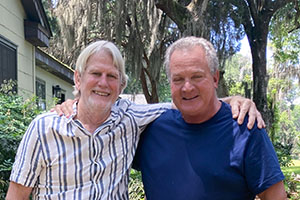Publisher's Note
The shootout with lawmen at the Sebastian River Bridge that left John Ashley and three of his gang members dead happened exactly a century ago come Nov. 1. Yet the story continues to fascinate. You only have to see the throngs visiting the Elliott Museum in Stuart, which recently created a permanent Ashley Gang exhibit, to understand the public’s enduring interest...
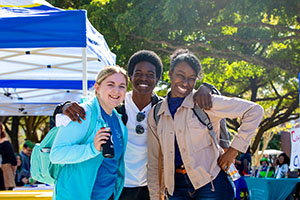 Providing a head start to higher education
Providing a head start to higher education
Not every high school graduate needs to go to college.
But every high school graduate should have the option to attend college.
Thanks to Indian River State College’s Promise Program, most area high school graduates can attend their first two years of college free of tuition....
Welcome to 2024.
I’m not good at keeping resolutions, and because I’m more backward-looking than forward-thinking I prefer to reflect on the things I accomplished in 2023 without really trying. That way, I’m not disappointed with myself for falling short of a goal. Looking back on 2023...
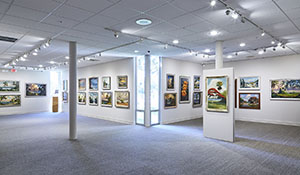
Why did we come here?
If you weren’t the one leading your family’s move to Florida, your children or other descendants may be asking that question one day.
We as Floridians are a collection of immigrants or descendants of immigrants who came here for a particular reason, whether it was for the sun and semi-tropical weather, to follow family who had already landed here, a job transfer or simply for a new adventure. The universal reason: to seek a better life...
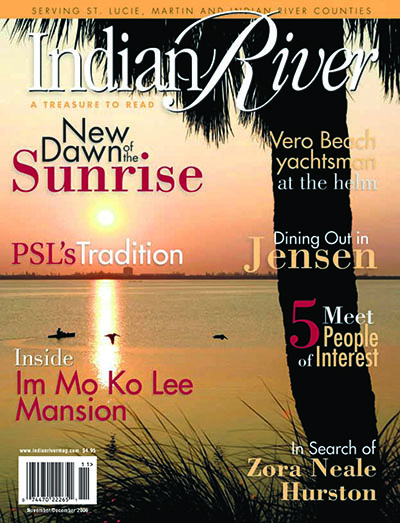
Welcome to October and the start of our 18th publishing year. This is always one of our favorite issues because it marks the beginning of another season covering the Treasure Coast. The first Indian River Magazine came out in October 2006, so the fall issue always reminds us of how far we’ve come over the years. Thanks to faithful readers like you and our advertisers we continue to grow and expand.
Our fall publication also contains the annual Treasure Coast Medical Report. Find out about a growing trend called concierge health care, in which physicians, for a retainer, provide direct personalized primary care to individual patients. In essence, concierge care puts the physician on call for the patient. This feature by Kerry Firth begins on Page 16.
 Recalling a lifetime at the Sunrise Theatre
Recalling a lifetime at the Sunrise Theatre
As millions of people watched their television screens to see Neil Armstrong and Buzz Aldrin land the Apollo Lunar Module Eagle on the moon July 20, 1969, I was watching a different screen.
I was at the Sunrise Theatre in downtown Fort Pierce, seated in the middle of the theater, watching a double bill: The Beatles’ Yellow Submarine and Don Knotts in The Love God. I remember my dad picking us up at the Sunrise that day and telling us that man had landed on the moon. I’m not sure that I responded with anything but disappointment that the Don Knotts in The Love God wasn’t the same one I knew in The Andy Griffith Show.
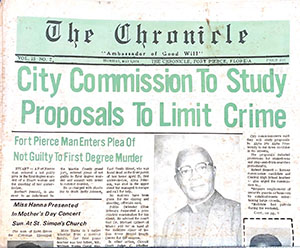 Saving history one page at a time
Saving history one page at a time
History can be tough enough to report in the best of circumstances.
While reporting the Cow Creek Chronicles series that appeared in the most recent issues of this magazine, I was fortunate to rely on newspaper accounts dating back to the early 1900s for much of my research. The subjects of my reporting, the Raulerson and Sloan families, were well-known and I was able to create my narrative with the help of what appeared in the newspapers back then.
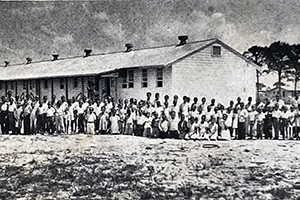 Festival returns to the days of 1923
Festival returns to the days of 1923
Welcome to 2023
Warm wishes to you for a terrific year ahead.
If you know our magazine, then you know that Treasure Coast history is our franchise.
One of our sections, called Living History, is intended to bring history alive by connecting past events to how they have shaped the present.
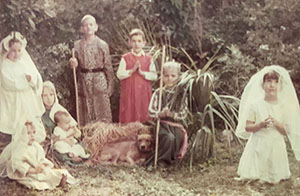
A Florida Christmas to remember
As a child growing up on the Treasure Coast in the 1960s and early ’70s, I always had difficulty relating to popular images of Christmas such as carolers singing in snow-covered villages, sweater-clad ice skaters gliding over a frozen pond or horses merrily pulling sleighs. We simply didn’t have snow for the holidays, and many Christmases were warm enough to go to the beach.
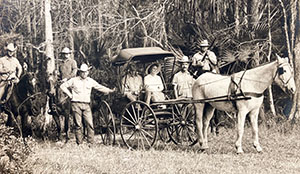 Festival revisits rich history of the Treasure Coast
Festival revisits rich history of the Treasure Coast
If you’ve been following our Cow Creek Chronicles series — or if you just want to learn more about early Florida cattle ranching and folk ways — you’ll want to mark 12:30 p.m. Saturday, Jan. 14, on your calendar.
That’s when we’ll be presenting a Cow Creek Reunion on the main stage of the Sunrise Theatre in downtown Fort Pierce.
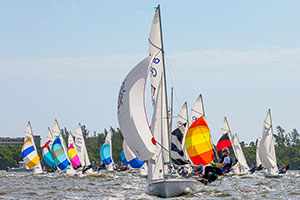
Publications inform, entertain readers for all seasons
There was a time on the Treasure Coast when a significant portion of the population headed north for the summer and some businesses rolled up for a few months until fall. Not anymore.
Now commerce on the Treasure Coast is in almost full throttle 12 months a year...

Series chronicles history of cattle-ranching family
If you’ve been following our magazine since its launch 16 years ago you may notice that we’re doing something different this issue. Like the magazines of old, we’re running a series.
The Cow Creek Chronicles follows a pioneering Treasure Coast family and their cattle ranch through the generations. The first installment starts with this issue and we hope you’ll be looking forward to the next installment after you read it...
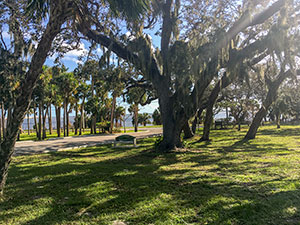
Digging the history of the old Army site in Fort Pierce
When I was 5 years old, my family moved from a house on 13th Street in Fort Pierce to one along the Indian River, just a few blocks south of downtown. It wasn’t long before my siblings and I began exploring the neighborhood and came upon a site just about a block south that we called the Indian mound...

A year of new beginnings and sad endings
As 2021 comes to a close, we look back on the things we gained — and those we lost — over the past year.
As a business, we were happy to add another magazine, Space Coast Living in Brevard County, to our seven magazines serving the Treasure Coast. Its acquisition has enabled us to cover all the communities up and down the 156-mile Indian River Lagoon waterway, making us the leading magazine company for both the Treasure Coast and the Space Coast...

‘The river’ flows on, continuing its teaching ways
When I was a child, I had the good fortune of growing up on the Indian River.
It was the playground of my childhood. My best times were spent on the river, whether it was fishing, motor boating, skiing or, my favorite, sailing. Back then we called it the Indian River or simply “the river.”
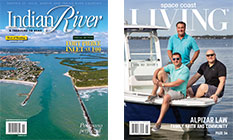
Acquisition enhances coverage of intertwined communities
Before 1905, St. Lucie County and what is now Indian River County, and much of Martin County were part of Brevard County, which was named after the early settler Theodorus W. Brevard.
At the turn of the century, Brevard ran more than the length of the 126-mile Indian River, which stretches from just above Brevard at the Ponce Inlet in the north to the St. Lucie Inlet in the south. In the early days, people reached this part of Florida on foot or by boat. By 1877, commercial steamships were ferrying passengers up and down the shallow Indian River, increasing access to Fort Pierce, a former Seminole War fort, and places that later became Vero Beach and Stuart.
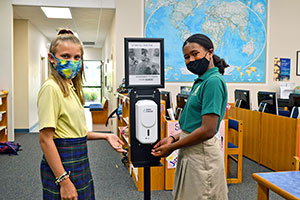
Future of education may be one of choice for students
It’s been exactly a year since our way of living was utterly rearranged by the coronavirus pandemic. We are once again seeing a drop in numbers and this time, with the introduction of vaccines, the trend is likely to continue.
As we attempt to go back to live the lives we had before COVID-19, we shall continue to adapt to what coronavirus has wrought.
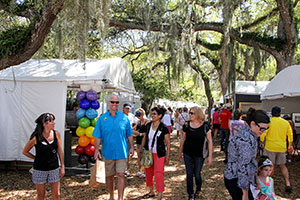
When COVID-19 made its way to Florida in March, we knew we were in for turbulent times. Many thought that the virus would be around for a few months before dissipating like seasonal flu.
Few people predicted a virulent second wave this fall that would spike numbers ever higher, exhausting front-line workers and fatiguing the public. The development of a vaccine has brought new hope that the end may be in sight. Besides sickness and loss of life, what else has coronavirus left us?
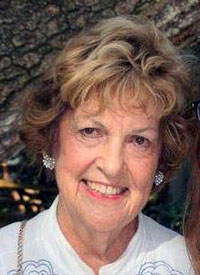
In the 15 years since we launched this magazine, one reader has shared her opinion about how we are doing or what we should be doing more than any other.
That would be my mother, Katie Enns, who has always been quick to suggest a good story, note who might be a good advertiser or critique our latest issue.
In nearly all cases, her observations have been unsolicited, unfiltered and unrelenting. But they certainly never have been unknowing.
That’s because for 36 years, until his death in 1990, she was married to my dad, Bob Enns, the longtime editor of The News-Tribune in Fort Pierce. How she came about her journalistic acumen requires some explanation about her migration to Florida from her hometown of Cedar Rapids, Iowa.

Thank you to our readers for your support over the last six months as we adjusted to the new reality brought on by the coronavirus pandemic. Our paid subscriptions are actually up over the previous year during the same time, demonstrating that the demand for our magazine is stronger than ever.
Thank you to our advertisers for continuing with us during these difficult times. While some advertising categories have been unable to advertise, others such as those related to home improvement have remained strong. While we suffered a decline in advertising last spring as the pandemic set in, we are heartened to report that our numbers for this fall are actually ahead of what they were the same time last year.
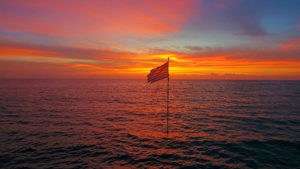
Extraordinary efforts for extraordinary times
What a difference a few months make.
When I was writing this letter for the last issue in late February, our magazine company, like many Treasure Coast businesses, was headed for another record year, with plans to expand our business and no end in sight.
And then the coronavirus pandemic hit, temporarily shutting many of the businesses along the Treasure Coast. Advertising is the lifeblood of our business, and because many of our advertisers were shut down or severely hampered, our advertising diminished as well.

Back when Associate Publisher Allen Osteen and I launched this modest publishing effort 14 years ago, we set out on a mission to visit several key community leaders to let them know what we were doing. At the top of our list to visit was Ed Massey, the president of Indian River State College.
Massey accepted our meeting request. I had been away from the Treasure Coast for 22 years but vaguely recalled Massey’s days as an assistant administrator while I was a reporter covering the college for the Fort Pierce News-Tribune in the 1980s.
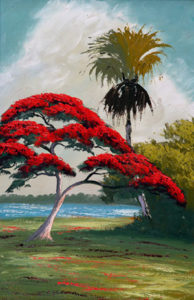
“Ambition — Artist.” That’s what the late Alfred Hair’s yearbook photo says, right above a portrait of a captivating young man gazing into the distance, as if he’s imagining that future and exactly how he’s going to get there. A hint to the how is also right above the photo: “Hobby — Hot Rodding.’’ Before he died at the age of 29, the young man who loved art and cars had not only achieved his ambition but was the star of the movement of African-American landscape painters (and roadside art dealers) that would become known as the Highwaymen. In anticipation of an exhibition of Hair’s paintings at A.E. Backus Museum & Gallery opening this month, writer Catherine Enns Grigas, who has also penned a book about the Highwaymen, takes a look back at the artist who was always looking ahead.
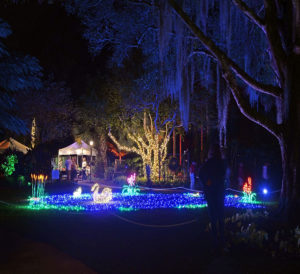
What does the word “season” mean to you? Does it call to mind that time of the year on the Treasure Coast when the weather gets a little cooler, the roads get a little busier and the calendar gets a lot fuller? Us, too. Or does it make you think of turkey stuffing, strands of lights and “Auld Lang Syne?” We’re right with you. In this issue, we celebrate it all.

We have a lot to share with you since you saw our last issue over the summer.
First, we’ve added a new magazine, Treasure Coast Business, to our list of publications, with the first issue publishing in June and the second one in September. This quarterly magazine is a business-to-business publication that reaches business leaders and business owners and operators in St. Lucie, Martin and Indian River counties.
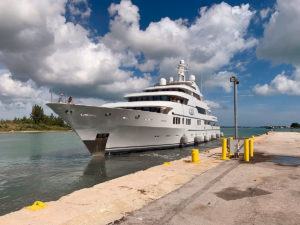
Boating, fishing and other water-related activities are among the enjoyable pursuits that attract residents and visitors to the area. In this annual boating issue, readers will discover just how important this specialty has been for our shores in the past and the present. Shipping is an essential ingredient for the Treasure Coast, which, after all, got its name from the gold coins and artifacts left scattered near our beaches and in our ocean following the tragedy of the Spanish fleet that was destroyed during the 1715 hurricane. Pirates were among the early salvagers who tried to take advantage of these lost treasures. But this was only the beginning.
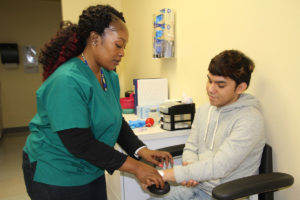
Training that uplifts community
There’s an alternative to struggling through four or more years at a university with expenses that could affect you for a lifetime. Technical or trade schools give many young people a jump on their careers with affordable rates and less time in training. These institutions aren’t for everyone, and many students benefit greatly by attending a standard college or university, especially if they have chosen professional positions for their career paths. Other students, however, can focus on job-specific training courses at technical centers that help them enter directly into the workforce.

Saving history one page at a time
When I was a rookie reporter at the Fort Pierce News-Tribune back in the late 1970s, I wore a variety of hats (but never a green eye-shade like you see in the old movies). As the youngest and least-tenured reporter on the staff, I was thrown a variety of assignments the senior reporters were able to avoid. Most of these involved putting together items that had templates so they could be easily or quickly written. In other words, things that didn’t require much writing talent.

Because of our intense interest in history, you’ve probably learned about the origins of the region’s geographic names from many of the stories that have appeared in this magazine over the last decade.
To start with, the name Treasure Coast is a relatively new invention that came into use only in the last half-century when promoters wisely realized that they could increase the region’s profile by referring to the riches that spilled onto our shores 300 years ago when a fleet of Spanish ships sank in a hurricane. Before Treasure Coast, the region was known as the Indian Riverland, named for the lagoon that runs through our three counties. The lagoon itself was originally named Rio de Ais, after the Ais Indians who lived in the region. Thus, the name evolved to Indian River.


